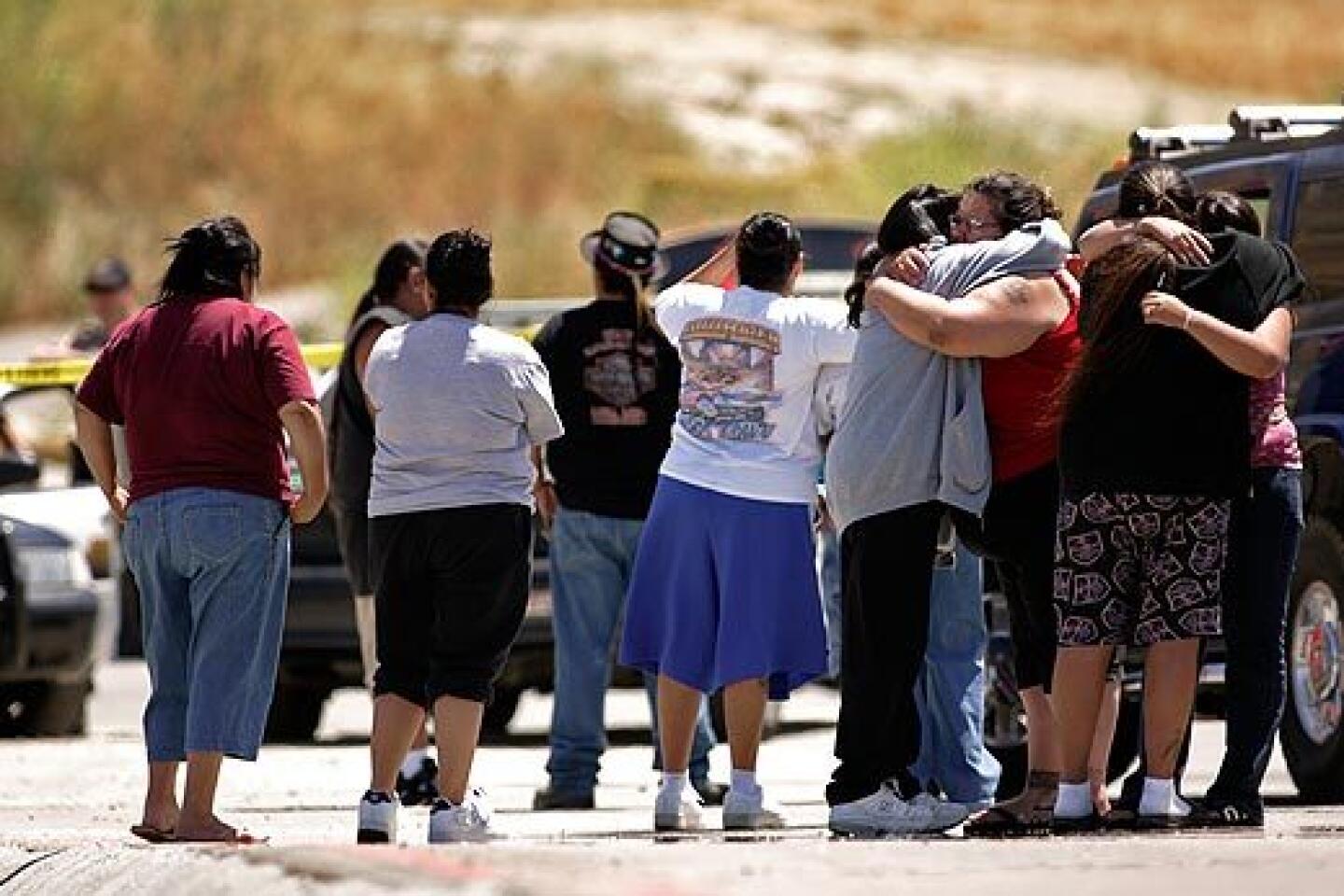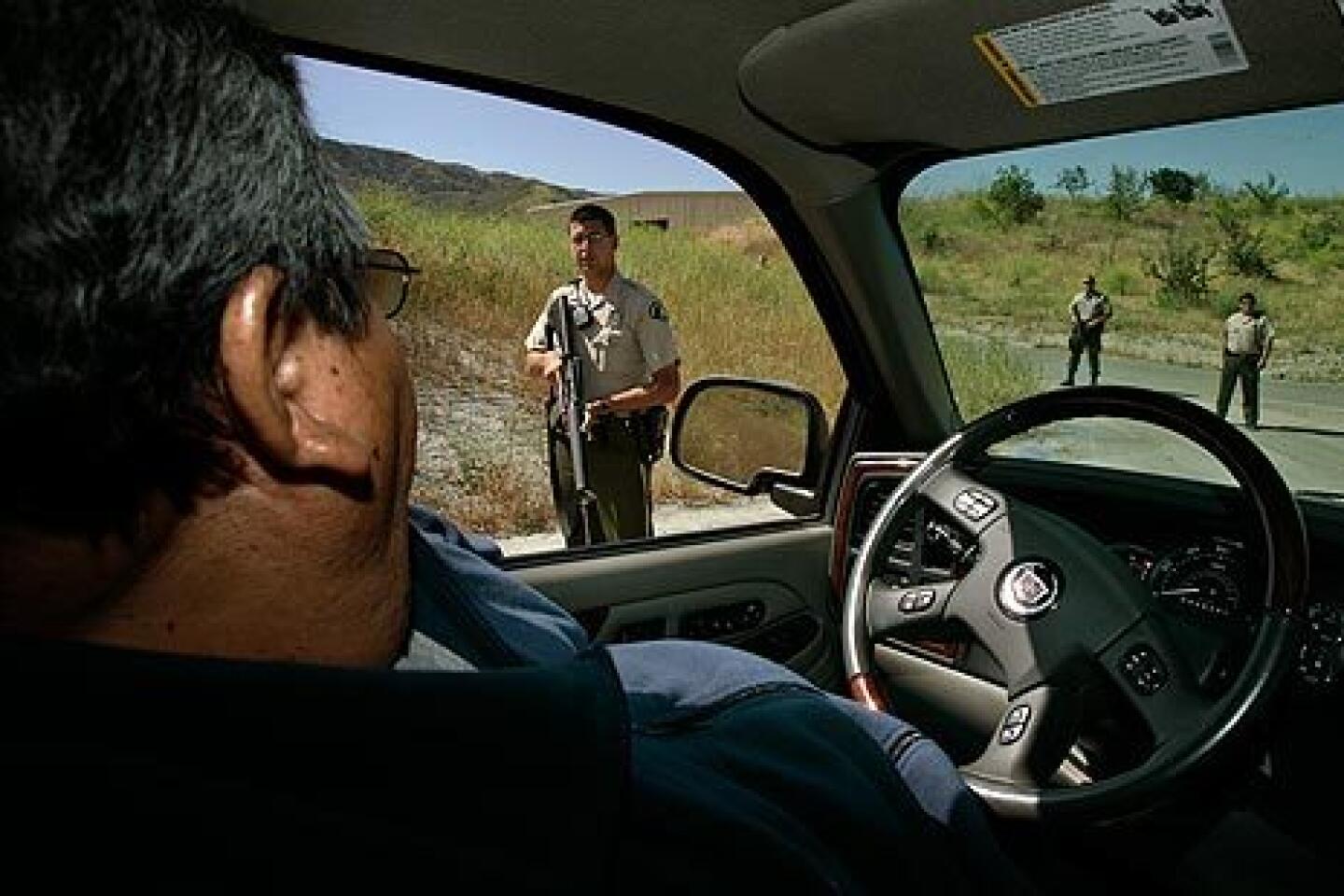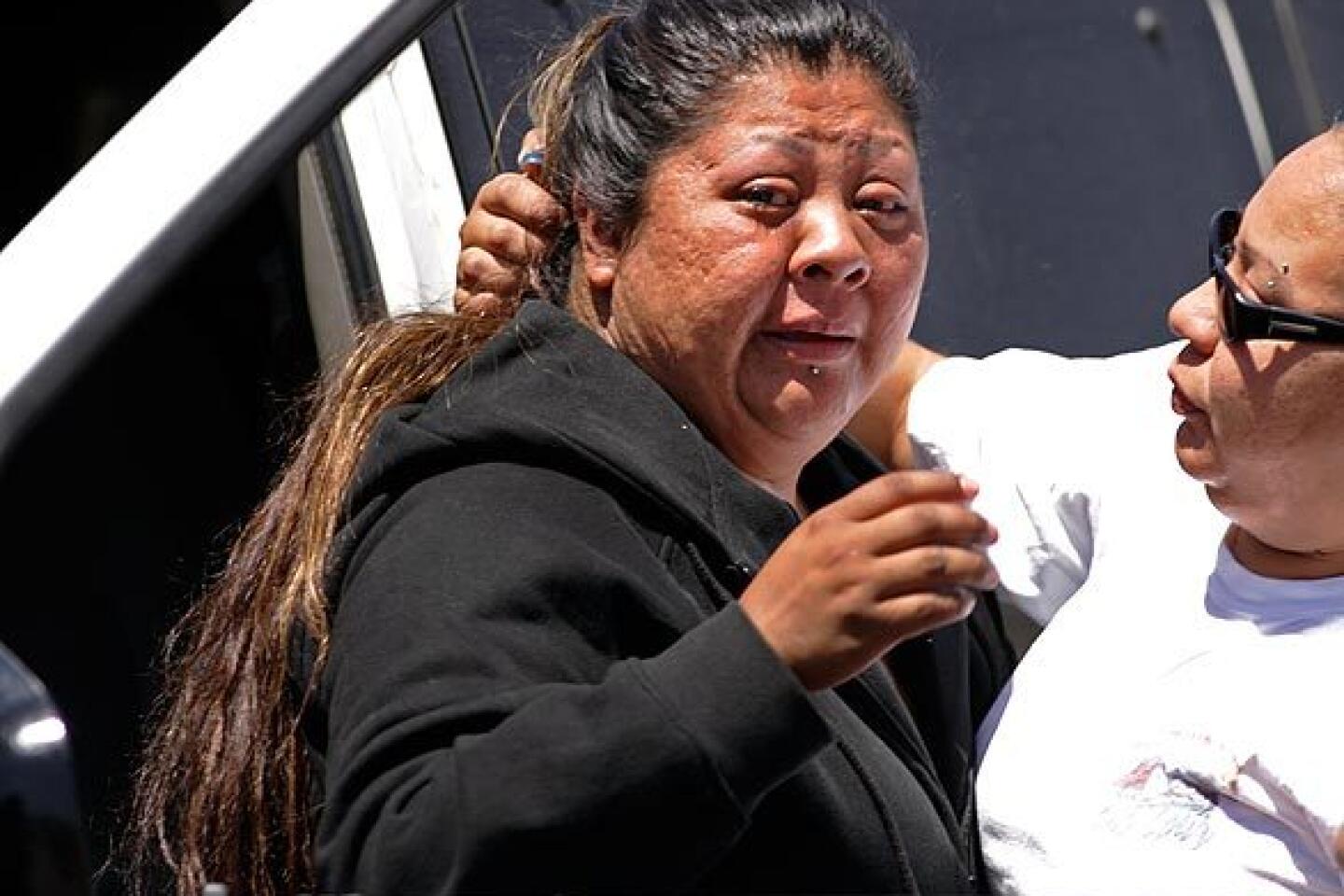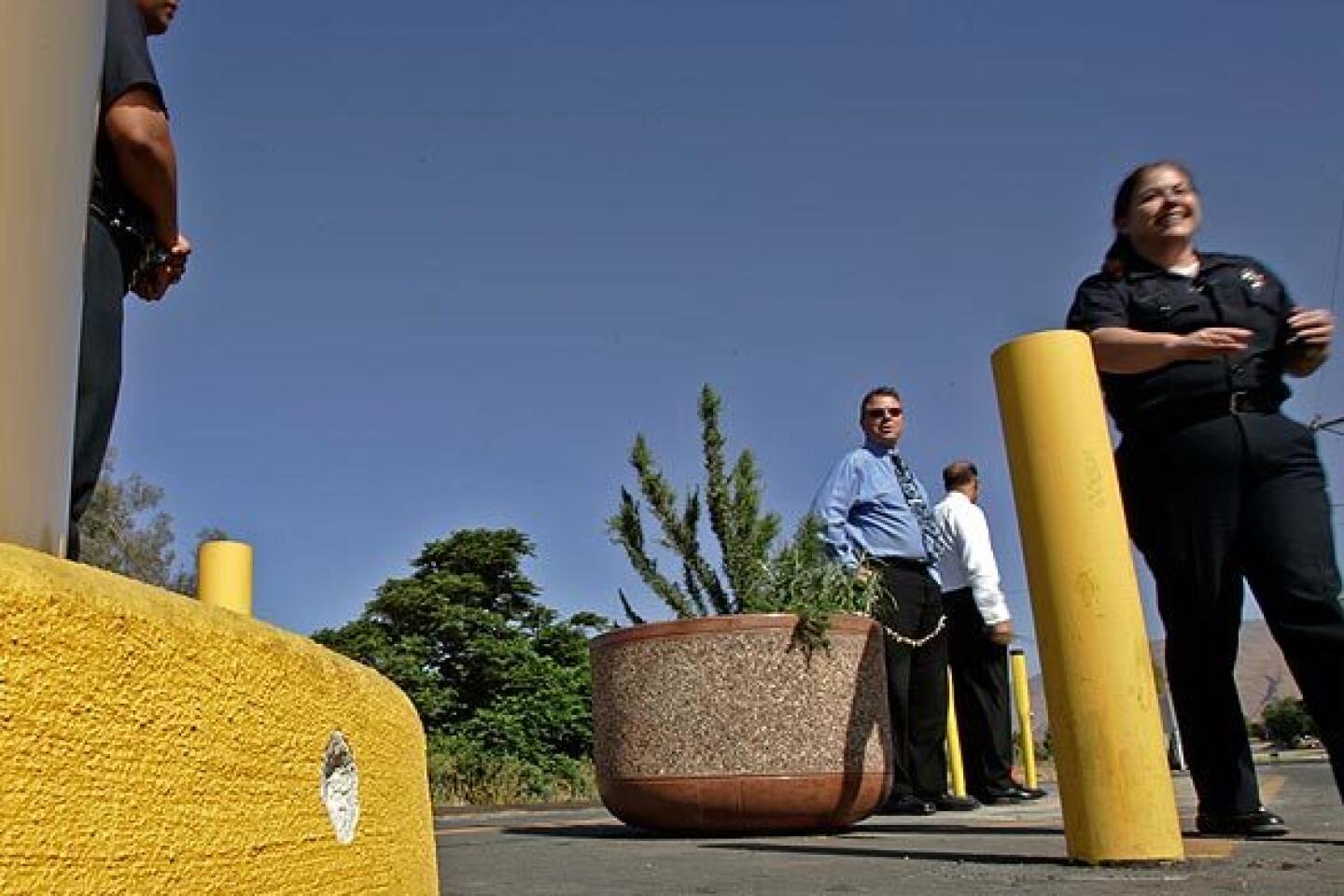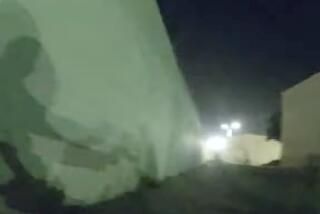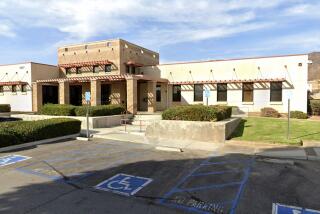Riverside County tribal members are angry after two latest killings by deputies
- Share via
A wild gun battle between Riverside County sheriff’s deputies and a pair of suspects on the Soboba Indian Reservation left two people dead and tribal members frustrated and demanding answers Tuesday.
“There are better ways to solve these problems than by bringing in the 7th Cavalry and wiping them out. I would say we are in a war right now,” said Robert Salgado, Soboba tribal chairman and a cousin of those killed.
Monday’s fatalities were the second and third tribal members in the last week killed by deputies in gun battles.
There have been three other shootings on or near the reservation near San Jacinto since December.
The situation has deteriorated so much that the California Department of Forestry and Fire Protection said last week it would no longer enter the 6,000-acre reservation without a police escort.
“We received intelligence saying they would be phoning in false fire calls to draw us into the reservation,” said Capt. Julie Hutchinson, an agency spokeswoman. “There is a general threat to uniformed personnel there. It’s not everyone on the reservation. It’s a faction that is out of control.”
The Bureau of Indian Affairs will hold a meeting Friday among tribal leaders, members of the Sheriff’s Department and representatives from the office of Rep. Jerry Lewis (R-Redlands).
“We want to bring them together so they can have a working relationship and rebuild trust,” said James Fletcher, Bureau of Indian Affairs superintendent for Southern California. “We want to settle this violence so we won’t have people being shot to death.”
Monday’s incident began about 6:20 p.m. when a guardhouse at the reservation entrance came under rifle fire.
“When deputies arrived they were shot at in their car,” said Sgt. Dean Spivacke of the Sheriff’s Central Homicide Unit. “A helicopter was called in and was overhead when they were also shot at.” The aircraft wasn’t hit.
The attackers, armed with AR-15 and SKS assault rifles, fled into the rural reservation, which sits along a rugged belt of foothills near San Jacinto.
A sheriff’s SWAT team was called in. After the team located the suspects, an hourlong gunfight ensued involving nine officers. The two tribal members, 36-year-old Joseph Arres and an unidentified woman, eventually were killed near a football field.
The bodies lay where they fell until the coroner’s office retrieved them Tuesday. Distraught family members demanded that they be allowed to see the bodies and perform Native American rituals for them.
Not far away, the bells of St. Joseph Mission rang every 10 seconds for the dead.
The same bells rang last Thursday after Eli Morillo, 26, was killed during a gunfight with deputies that went on for hours and involved SWAT members, armored vehicles and deputies. Morillo’s brother Peter was shot dead by police in 2002. Their mother, Rosemary Morillo, is a former tribal chairwoman.
In December, two deputies were shot while chasing suspects heading for the reservation. Their injuries were minor.
Authorities temporarily shut down the main road leading in and of the reservation Monday. Salgado spent the night outside the reservation’s casino in his Escalade.
Early Tuesday he drove into the reservation, his indignation growing by the minute. He had been on the phone with the state attorney general’s office, the U.S. attorney’s office and lawyer Gloria Allred’s office.
“We feel our civil rights have been violated,” he said. “These guys are running around here with assault rifles like they are in Iraq. They shoot first and ask questions later.”
Sheriff’s officials said they reacted properly to a brazen attack not only on them but also on Soboba tribal members manning the guardhouse.
Tearful residents said they understood that but thought their own people should have had a say in the matter.
“This is a crisis that didn’t need to happen, and now we have three families that are in mourning,” said Julie Parcero, a tribal council member.
Salgado nodded.
“These are our people. We know them,” he said. “I think we could have talked them out of it.”
The reservation is nicer than many, with neatly kept homes behind locked gates framed by steep, craggy hills. There is a school, a new administrative center, a manicured football field and 200 acres of ruby red grapefruit grown for export to Japan. About 600 people live inside.
Salgado, 65, is proud of his land and close to his people. He says there are problems with alcohol and drugs, especially methamphetamine and cocaine. Gunfire, he said, is heard commonly, though he insists that violence isn’t any greater here than most other places in Riverside County.
“I don’t know how many weapons people have. It’s not against the law to have weapons,” he said. “I don’t have any weapons.”
As he drove along back roads Tuesday, Salgado was determined to find the spot where Monday’s shootout took place. He found it near a shady area called The Oaks. He approached slowly, only to be confronted by a half-dozen deputies cradling rifles.
One demanded to know who he was.
“I’m the tribal chairman,” Salgado replied.
The officer told him he could go no further.
Salgado bristled.
“See why I’m angry? You see what I’m talking about?” he asked as he drove off. “If I was the mayor of L.A. and I was visiting a crime scene, they would have said, ‘Hey, how you doing?’ but they treat me with no respect. Do we look like gangsters?”
Salgado said he believes some of the tension stems from 2006, when he canceled a contract with the Sheriff’s Department that paid for deputies to patrol the reservation.
“We paid $400,000 and we didn’t see the benefits, so we did away with the contract,” he said.
A few miles away he ran into Johnna Valdez, 43, who said an armed deputy forced her and others to leave a basketball game in the school Monday night.
“He made us walk out single file. We all had to lift our shirts to make sure we didn’t have weapons,” she said.
Capt. Glenn Worby, who commands the Sheriff’s Department Hemet station, which responds to crime on the reservation, said he has offered to meet with the tribe to discuss problems. So far, he said, no one has taken him up on it.
“I have no desire to meddle or get involved in tribal matters. But when it comes to public safety we will do whatever is right, legal and in the best interests of the tribe and the community at large,” he said.
More to Read
Sign up for Essential California
The most important California stories and recommendations in your inbox every morning.
You may occasionally receive promotional content from the Los Angeles Times.
